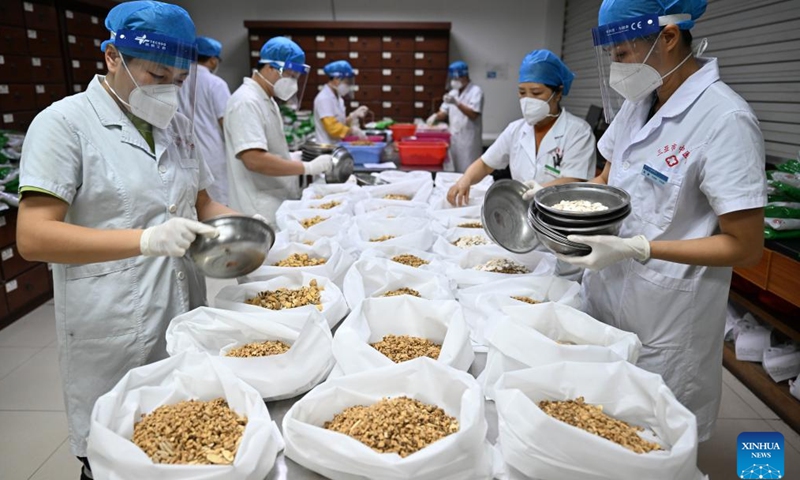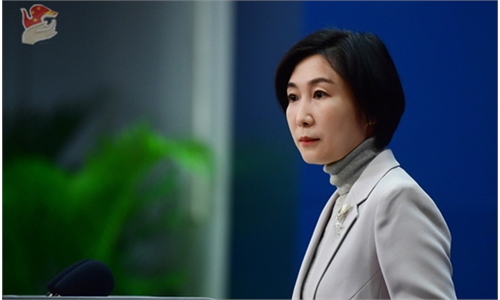China calls for collaboration of city hospitals and rural clinics to cope with COVID surge

Pharmacists prepare Chinese herbal medicine at the Traditional Chinese Medicine Hospital of Sanya City in Sanya, south China's Hainan province, Aug. 20, 2022.Photo:Xinhua
As the COVID-19 outbreak in China gradually sweeps into rural areas where medical systems are relatively weaker, governments and medical experts are calling for coordinated collaboration between big hospitals and grassroots medical institutes. They ask the latter to upgrade their capacity of treating patients as the grassroots hospitals are facing shortages of medicine and medical staff.
The State Council joint prevention and control mechanism against COVID-19 stressed the importance of ramping up efforts in medical treatment and preparing anti-COVID materials, at a press conference on Wednesday, according to information published by the National Health Commission on Thursday.
The meeting asked major hospitals across the country to make full efforts in treating severe cases among the elderly and children. It also asked big hospitals to collaborate with county-level hospitals and nursing homes; and under no circumstances should any hospital decline patients.
The meeting vowed to coordinate medical resources, enhance monitoring of COVID-19 outbreaks and take measures to reduce numbers of patients at the outbreak's peak.
COVID-19 cases increased rapidly after China optimized its epidemic response earlier this month. Big cities such as Beijing and Guangzhou were the first to bear the brunt. Case surges began to sweep rural areas, where the medical system is relatively weaker. Shortages of medicines and medical staff are the major problems they are facing.
"We have extended the time of our medical services by at least three hours to meet the growing need, and the regional authorities also help to coordinate some medical staff from private medical institutions to work in the center," an employee at a town community healthcare center in Suzhou, Jiangsu Province, told the Global Times on Thursday.
The center has more than 20 medical sites and more than 100 working staff deployed in the region to provide medical services for local residents. But they still face a shortage of medicine.
"We give a maximum of three days of medication to COVID-19 patients temporarily, and we are making all efforts to coordinate with medicine suppliers," the employee said. The center received about 100 fever patients on average during recent days, which is relatively high compared with previous times, according to the employee.
The head of a village hospital in Chongqing, who only gave his surname as Chen, told the Global Times on Thursday that his hospital received dozens of fever patients in the past week, and almost half of them tested positive for COVID-19.
Chen said the major problem right now is a shortage of medicines, as the hospital failed to stockpile medicine before the policy change. He said that his colleagues tried to calm down villagers, and advised them against stockpiling medicines.
"Almost one-third of the residents in our village are elderly, so our focus is to give them timely and proper treatment…if their situation is critical, we will immediately send them to county-level hospitals, where medical conditions are better," Chen said.
As of the end of 2021, China had 17,000 county-level hospitals, 35,000 village hospitals and 599,000 village clinics, according to data published by the NHC on December 7. In 2021 alone, 4.24 billion visits were paid to those medical institutes, accounting for 50.1 percent of the national total.
During a Wednesday seminar, Zhang Wenhong, head of the infectious disease department at Huashan Hospital in Shanghai, also director of the National Center for Infectious Diseases, said that early treatment of severe cases is "life-saving" during the epidemic, thus upgrading the capacity of grassroots hospitals will play a significant role.
Wu Hao, a national-level disease control expert and public health professor at Capital Medical University in Beijing, told the Global Times that it might be difficult for smaller villages to set up enough ICU beds at such short notice, so they need to transfer patients in need to higher-level hospitals, and the government is making plans to open green channels for such transfers.
Chen from the Chongqing village hospital pointed to another quandary regarding medical staff. For those who have mild or no symptoms, we advised them to work anyway. He believed the strain on medical staff hasn't peaked yet, as the Chinese New Year, which falls on January 21, 2023, comes near, such stress will be more palpable.
Many hospitals, including grassroots ones are hiring more paid staff. A hospital in Xinyang county, Shandong, issued a notice on Monday, saying that such workers for medical treatment and medical care will serve from January 1 to March 31, 2023. Each will receive 200 yuan ($28.65) per day, media portal The Paper reported.
Wu said that the infection waves in big cities may ebb when the Chinese New Year nears, which can free medical workers in the cities to support rural areas in treating patients.



